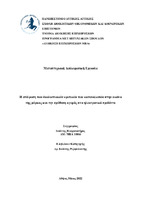| dc.contributor.advisor | Rizomyliotis, Ioannis | |
| dc.contributor.author | Βλαχοσωτήρος, Ιωάννης | |
| dc.date.accessioned | 2022-06-24T07:21:07Z | |
| dc.date.available | 2022-06-24T07:21:07Z | |
| dc.date.issued | 2022-05 | |
| dc.identifier.uri | https://polynoe.lib.uniwa.gr/xmlui/handle/11400/2357 | |
| dc.identifier.uri | http://dx.doi.org/10.26265/polynoe-2208 | |
| dc.description.abstract | Το διαδίκτυο και οι τεχνολογίες πληροφοριών έχουν προσφέρει νέες ευκαιρίες στους καταναλωτές να μοιράζονται με άλλα άτομα, ηλεκτρονικές αξιολογήσεις μιας σειράς προϊόντων/ υπηρεσιών. Στο τρέχον, ψηφιοποιημένο περιβάλλον, το eWOM, έχει καταστεί ένας από τους πιο σημαντικούς διάμεσους, σε επίπεδο απόκτησης και αξιολόγησης προϊόντων, ενώ μπορεί να αποτελεί ένα ισχυρό εργαλείο άσκησης επιρροής, ανάμεσα σε καταναλωτές, ή ομάδες καταναλωτών. Συνεπώς η ηλεκτρονική διάχυση και εσωτερίκευση σχολίων, ανάμεσα σε καταναλωτές, μπορούν να αποτελούν, πολύ σημαντικούς παράγοντες επιρροής των αγοραστικών αποφάσεων των σύγχρονων καταναλωτών. Ο σκοπός της παρούσας εργασίας ήταν η διερεύνηση της επίδρασης των διαδικτυακών κριτικών, στην πρόθεση αγοράς των καταναλωτών (στο πλαίσιο των ηλεκτρονικών προϊόντων), διαμέσου του brand image | el |
| dc.format.extent | 79 | el |
| dc.language.iso | el | el |
| dc.publisher | Πανεπιστήμιο Δυτικής Αττικής | el |
| dc.rights | Αναφορά Δημιουργού - Μη Εμπορική Χρήση - Παρόμοια Διανομή 4.0 Διεθνές | * |
| dc.rights | Attribution-NonCommercial-NoDerivatives 4.0 Διεθνές | * |
| dc.rights.uri | http://creativecommons.org/licenses/by-nc-nd/4.0/ | * |
| dc.subject | Εικόνα μάρκας | el |
| dc.subject | Πρόθεση αγοράς | el |
| dc.subject | Διαδικτυακές κριτικές | el |
| dc.subject | e-WOM | el |
| dc.subject | Word of mouth | el |
| dc.subject | Brand image | el |
| dc.title | Η επίδραση των διαδικτυακών κριτικών των καταναλωτών στην εικόνα της μάρκας και την πρόθεση αγοράς στα ηλεκτρονικά προϊόντα | el |
| dc.title.alternative | The effect of online consumer reviews on brand image and purchase intention on consumer electronics | el |
| dc.type | Μεταπτυχιακή διπλωματική εργασία | el |
| dc.contributor.committee | Giovanis, Apostolos | |
| dc.contributor.committee | Καλλιβωκάς, Δημήτριος | |
| dc.contributor.faculty | Σχολή Διοικητικών, Οικονομικών & Κοινωνικών Επιστημών | el |
| dc.contributor.department | Τμήμα Διοίκησης Επιχειρήσεων | el |
| dc.contributor.master | Διοίκηση Επιχειρήσεων - Master in Business Administration (MBA) | el |
| dc.description.abstracttranslated | Internet has played a central role in people's daily lives, as people can chat over the internet, faster than ever, regardless of geographical distance, can send emails around the clock, search for information, and even procure goods / services electronics. Internet shopping has become widely accepted as a popular way to market products and services. Online shopping has proven
to be able to give more satisfaction to modern consumers who tend to seek convenience and speed. On the other hand, some consumers still feel uncomfortable with online shopping. Lack of trust, for example, seems to be the main reason that prevents consumers from accessing online shopping. Consumers may also need to examine (naturally) and feel the products, meet
with friends, and receive additional product reviews before completing a purchase. The Internet and information technology have provided new opportunities for consumers to share online reviews of a range of products / services. In recent years, when for various reasons, consumer confidence in organizations and advertising has declined significantly, the concept of WOM
(word of mouth) has emerged as a central means of fulfilling a number of advantages (from consumer perspective). In the current, digitized environment, eWOM has become one of the most important intermediaries in terms of product acquisition and evaluation, and can be a powerful tool for influencing consumers or groups of consumers. Therefore, the electronic
dissemination and internalization of comments, among consumers, can be very important factors influencing the purchasing decisions of modern consumers. The purpose of this paper was to investigate the effect of online reviews on consumers purchase intention (in the context of electronic products), through the brand image. | el |


